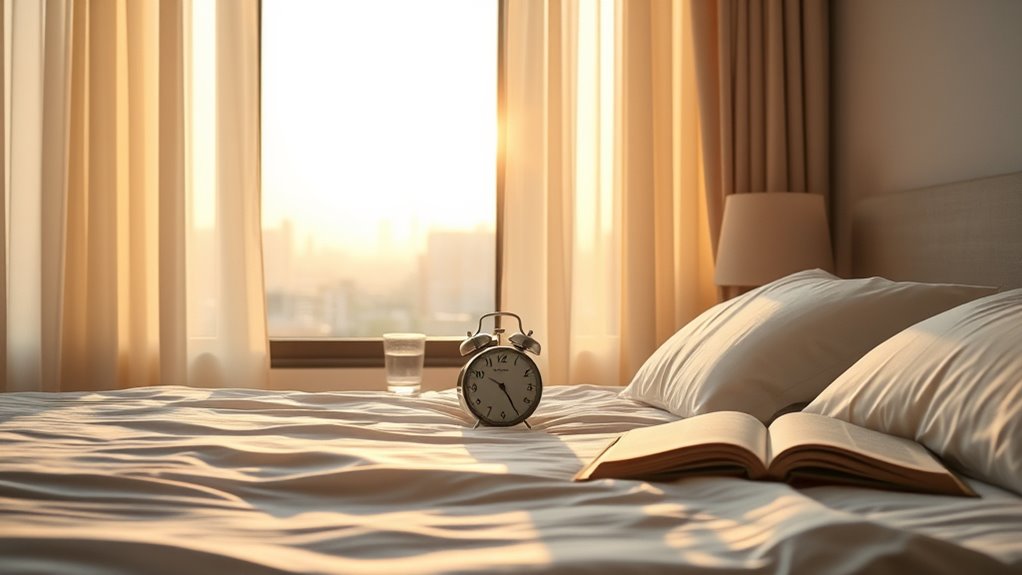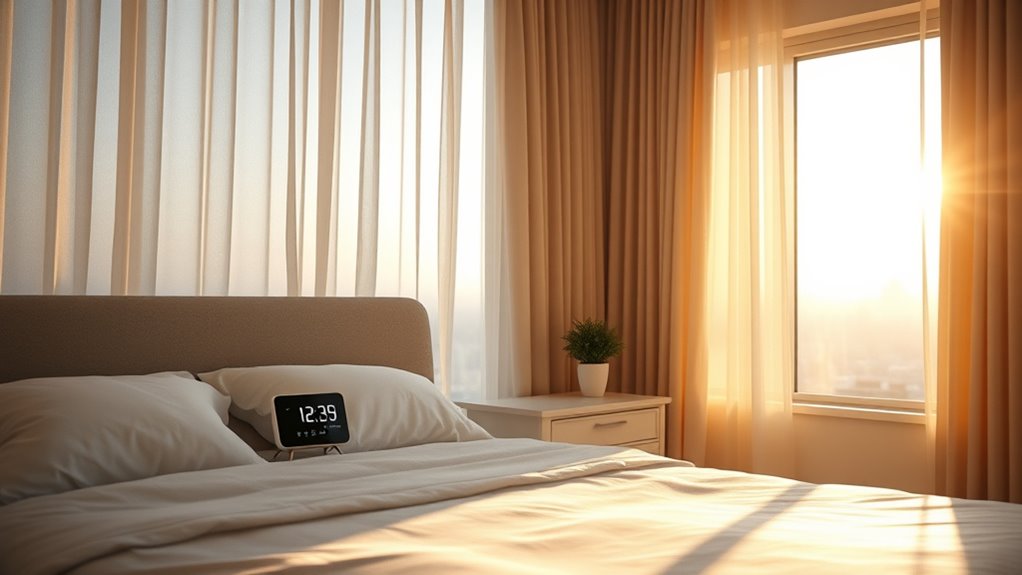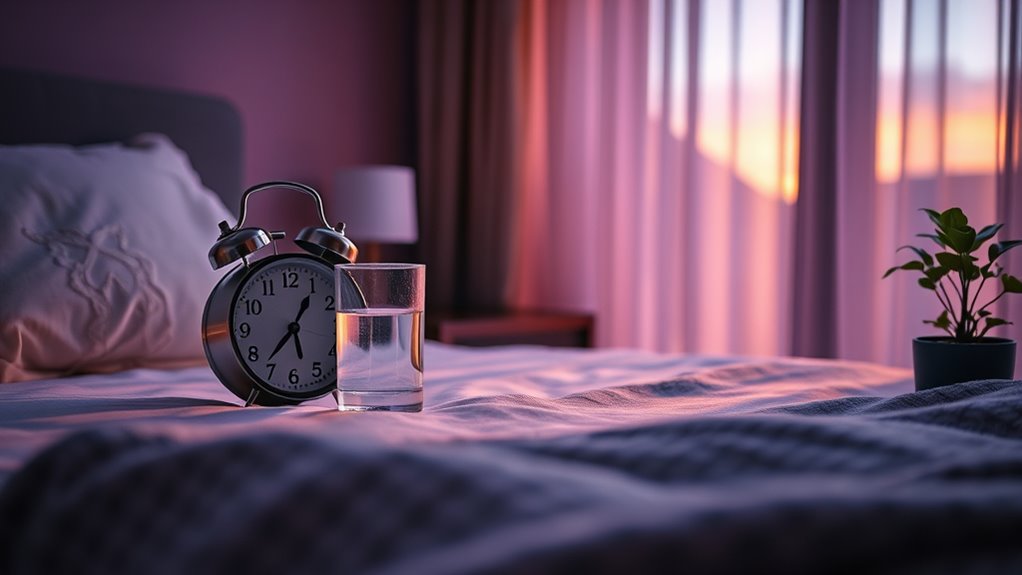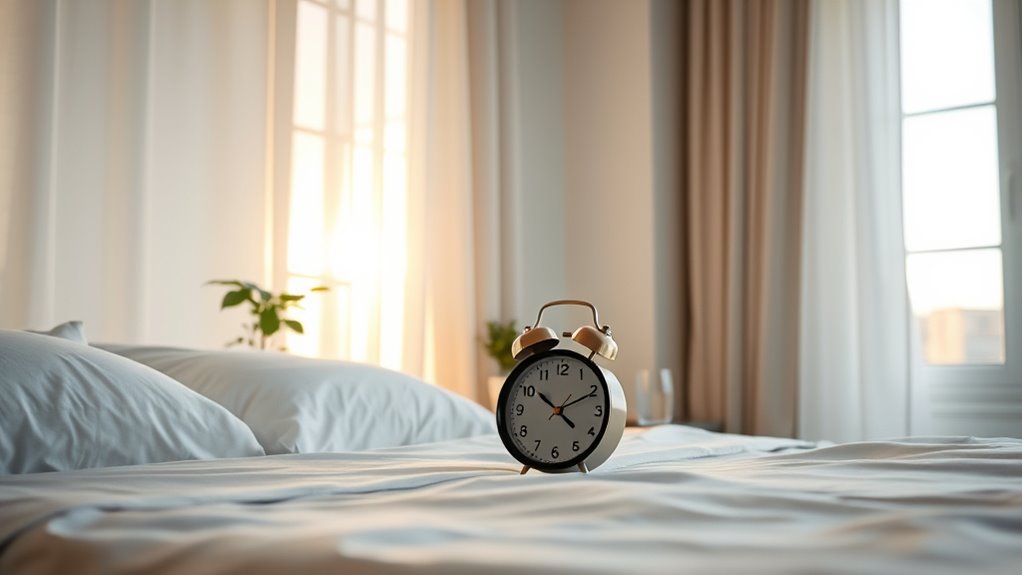Your body’s circadian rhythm controls your sleep-wake cycle and impacts many essential functions like hormone production, metabolism, and immune health. Light exposure, especially from screens and surroundings, influences this internal clock by suppressing or boosting melatonin, affecting your sleep quality and alertness. Disruptions can lead to health issues such as sleep problems, mental health concerns, and increased disease risk. Staying aligned with your natural rhythm can boost your overall health—discover how to optimize this biological clock further.
Key Takeaways
- The circadian rhythm is your internal 24-hour clock that regulates sleep, hormones, and metabolism, impacting overall health.
- Light exposure, especially natural sunlight, synchronizes your internal clock, influencing alertness and sleep quality.
- Disruptions to your circadian rhythm can increase risks of sleep disorders, metabolic issues, and mental health problems.
- Melatonin, a hormone affected by blue light, signals sleep readiness; managing light exposure supports healthy sleep cycles.
- Maintaining consistent sleep schedules and proper light management helps protect heart health, immune function, and reduce inflammation.
What Is a Circadian Rhythm?

A circadian rhythm is your body’s internal clock that regulates the natural cycle of sleep and wakefulness over roughly 24 hours. This biological clock influences various bodily functions, including hormone production, body temperature, and alertness levels. Your circadian rhythm helps you feel awake during the day and sleepy at night by syncing with environmental cues like light and darkness. It’s controlled by a group of cells in your brain called the suprachiasmatic nucleus, which responds to changes in light exposure. When your circadian rhythm functions properly, you experience better sleep quality, improved mood, and overall health. Understanding bank swiftifs codes can help ensure secure and efficient financial transactions that align with your needs. Additionally, environmental cues play a crucial role in maintaining a healthy circadian rhythm. Supporting your biological clock through consistent sleep schedules, exposure to natural light, and mindful lifestyle choices can help prevent disruptions and promote well-being. Disruptions to this biological clock, such as irregular sleep schedules or shift work, can lead to sleep problems and other health issues. Recognizing the importance of light exposure in regulating your circadian rhythm can further enhance your overall health and daily functioning.
The Science Behind Your Body’s Internal Clock

Your body’s internal clock relies on biological timekeepers that keep everything running on schedule. At the core is the brain’s master clock, the suprachiasmatic nucleus, which coordinates your sleep-wake cycle. Understanding how these mechanisms work helps explain how your body stays in sync with the day-night cycle. Additionally, recent advancements in AI-driven data analysis help researchers better understand circadian patterns and their impact on health through automation. These insights are supported by ongoing research into biological rhythms, which are fundamental to maintaining overall well-being.
Biological Timekeepers
Biological timekeepers, also known as circadian clocks, are internal mechanisms that regulate your body’s daily rhythms. These clocks are influenced by genetic variations, which explain why some people are naturally morning or evening types. Over thousands of years, humans have developed evolutionary adaptations that align these internal timers with environmental cues like light and darkness. Your biological timekeepers coordinate essential functions such as sleep, hormone release, and metabolism, ensuring they occur at ideal times. These mechanisms are deeply embedded in your genes, making them resilient yet adaptable across different environments. Recent research highlights the role of circadian rhythm in chronic conditions like sleep disorders and metabolic diseases, emphasizing the importance of maintaining a healthy internal clock. Understanding these genetic variations can help tailor lifestyle choices to support optimal health. Additionally, disruptions to your biological timekeepers can negatively impact skin health and overall well-being, highlighting the importance of aligning daily routines with your internal clock. Consistently respecting your natural sleep-wake cycle can enhance overall health and well-being.
Brain’s Master Clock
Have you ever wondered how your body keeps track of time so precisely? It all comes down to your brain’s master clock, located in the suprachiasmatic nucleus (SCN). This tiny region acts as the conductor, coordinating your circadian rhythm through neural pathways that connect to other parts of your brain and body. The SCN contains specialized cells with circadian genes that regulate daily cycles of activity and rest. When light hits your eyes, signals travel via neural pathways to the SCN, telling it whether it’s day or night. This synchronization ensures your internal clock stays aligned with the external environment. In essence, your brain’s master clock uses neural pathways and circadian genes to keep your body’s rhythm steady and precise. Additionally, ongoing research into AI safety measures highlights the importance of safeguarding complex systems, similar to how your circadian system maintains internal stability. Understanding these biological processes can also inform technological innovations aimed at improving health and well-being. Recognizing the role of neural signaling further underscores how your body maintains internal harmony.
How Light Influences Your Circadian Cycle

Light plays a vital role in keeping you alert during the day and signaling when it’s time to rest. Blue light, in particular, suppresses melatonin, making it harder to fall asleep if you’re exposed to screens late at night. Natural light helps regulate your circadian rhythm, keeping your sleep-wake cycle steady and healthy. Advances in automation technologies are also being used to develop personalized lighting systems that support your circadian health. Additionally, understanding seasonal variations can help optimize your exposure to natural light throughout the year. The design of bedroom lighting can significantly influence your sleep patterns by mimicking natural daylight cycles. Proper placement of air purifiers can also improve indoor air quality, further supporting your overall health and sleep quality.
Light’s Role in Wakefulness
As daylight enters your eyes, specialized cells in your retina detect the change and send signals to your brain’s master clock, the suprachiasmatic nucleus. This process helps regulate your wakefulness and sleep patterns through circadian entrainment. Exposure to natural light during the day boosts alertness and keeps your circadian rhythm aligned with the environment. In cases where natural light is limited, light therapy can mimic sunlight, helping reinforce your body’s internal clock. Regular morning light exposure promotes wakefulness and supports healthy sleep cycles. Additionally, using appropriate lighting in your home or workspace can further enhance your circadian alignment, especially during darker months or in indoor settings. Understanding light’s influence on circadian rhythms enables you to optimize your daily routines for better health and alertness. Recognizing the importance of biological clocks can help you develop habits that reinforce your internal timing. By understanding light’s role in wakefulness, you can optimize your daily routines to feel more alert and maintain better overall health, ensuring your circadian rhythm stays synchronized with the day-night cycle. Moreover, being mindful of light exposure during evening hours can prevent disruptions to your sleep quality.
Blue Light Suppression of Melatonin
Blue light, especially from screens and electronic devices, has a powerful effect on your circadian cycle by suppressing the production of melatonin, the hormone responsible for signaling sleepiness. When you’re exposed to blue light in the evening, it interferes with your body’s natural sleep signals, making it harder to fall asleep and stay asleep. This melatonin suppression occurs because blue light stimulates receptors in your eyes that send signals to your brain’s sleep-regulating centers. As a result, your internal clock gets disrupted, and your sleep-wake cycle shifts, leading to poorer sleep quality and daytime fatigue. Additionally, some light filters can help reduce blue light exposure and protect your circadian rhythm. Using blue light blocking glasses in the evening can further diminish blue light’s impact and support healthy sleep patterns. To protect your circadian rhythm, consider reducing blue light exposure before bed, using blue light filters, or wearing glasses that block blue light. Incorporating light management strategies can also help maintain your body’s natural sleep-wake cycle and improve overall health.
Natural Light’s Impact on Rhythm
Exposure to natural light plays an essential role in regulating your circadian rhythm, helping your body maintain a healthy sleep-wake cycle. In the morning, the dawn chorus signals your body to wake up, syncing your internal clock with the day’s natural light. Sunlight therapy, especially during morning hours, boosts alertness and mood by reinforcing your circadian cues. When you’re exposed to bright, natural light, your body suppresses melatonin production, making you feel awake and alert. Conversely, as evening approaches, decreasing natural light signals your body to prepare for rest. Regular exposure to sunlight helps keep your rhythm aligned, reducing sleep issues and improving overall health. Embracing natural light is a simple, effective way to support your body’s internal clock.
The Role of Melatonin in Sleep Regulation

Melatonin, a hormone produced by the pineal gland, plays a crucial role in regulating your sleep-wake cycle. As evening approaches, your body increases melatonin production, signaling that it’s time to sleep. If your natural rhythm is disrupted, you might turn to melatonin supplements to help reset your internal clock. These supplements can be effective, especially when combined with good sleep hygiene practices like maintaining a consistent sleep schedule and reducing screen time before bed. Melatonin works by signaling your brain that it’s time to wind down, making it easier to fall asleep. Keep in mind, though, that supplements aren’t a cure-all — they work best alongside healthy habits that support your body’s natural circadian rhythm.
Impact of Circadian Rhythms on Hormone Production

Your circadian rhythms don’t just influence your sleep; they also regulate the production of various hormones that affect your overall health. Throughout the day, hormone fluctuations follow a natural cycle, aligning with your internal clock. These hormonal cycles impact your energy, mood, metabolism, and stress response. Disrupting your circadian rhythm can cause irregular hormonal cycles, leading to issues like fatigue or mood swings. Understanding this connection helps you grasp how your body’s timing impacts wellness.
| Time of Day | Hormone Activity | Effect on You |
|---|---|---|
| Morning | Cortisol peaks | Wakefulness, alertness |
| Midday | Growth hormone slight rise | Energy, repair processes |
| Evening | Melatonin rises | Sleep readiness |
| Night | Hormone levels decline | Restorative sleep |
| Early Morning | Cortisol starts to increase | Prepare for the day |
Effects of Disrupted Rhythms on Health

Disrupted circadian rhythms can substantially harm your health by throwing off your body’s natural timing. When your internal clock is out of sync, you’re more prone to issues like fatigue, mood swings, and weakened immunity. For example, jet lag disturbs your rhythm after crossing time zones, leaving you exhausted and disoriented. Similarly, shift work forces you to be active during your body’s rest phase, increasing health risks. Here are some effects you might experience:
- Increased risk of cardiovascular disease
- Impaired glucose metabolism leading to diabetes
- Higher chances of mental health problems like depression
- Sleep disturbances and chronic fatigue
These disruptions can have long-term consequences if not managed properly, emphasizing the importance of maintaining a regular sleep schedule.
How to Align Your Lifestyle With Your Body’S Clock

To align your lifestyle with your body’s clock, start by establishing consistent sleep and wake times, even on weekends. Consistency reinforces your circadian rhythm, making it easier to fall asleep and wake naturally. Incorporate effective timing strategies by syncing activities with your body’s peak alertness periods. For example, schedule demanding tasks when you’re most alert and relax when you’re naturally winding down.
| Timing Strategies | Benefits |
|---|---|
| Regular sleep times | Enhances sleep quality and stability |
| Morning light exposure | Boosts alertness and circadian alignment |
| Limit evening screens | Supports melatonin production |
Strategies to Improve Your Circadian Health

Implementing targeted strategies can substantially enhance your circadian health and reinforce your body’s natural rhythms. Prioritize good sleep hygiene by maintaining a consistent sleep schedule, avoiding screens before bed, and creating a calming environment. Focus on meal timing by eating your meals at regular times each day, ideally aligning with daylight hours to support your internal clock. Here are four effective strategies:
- Stick to a consistent sleep and wake time, even on weekends
- Limit exposure to artificial light in the evening to promote melatonin production
- Schedule meals earlier in the day, avoiding late-night eating
- Get natural sunlight during the morning to reset your circadian rhythm
These habits help synchronize your internal clock, improving overall health and well-being.
The Connection Between Circadian Rhythms and Disease Prevention

Your circadian rhythms play a crucial role in disease prevention by regulating essential biological processes that maintain health. When your internal clock functions properly, it helps your body repair cells, control metabolism, and strengthen immune responses. Disruptions due to genetic predispositions or cultural practices, like shift work or irregular sleep, can increase disease risk. Understanding these influences allows you to optimize your circadian health. Here’s a quick look:
| Factor | Impact on Circadian Rhythms | Related Disease Risks |
|---|---|---|
| Genetic predispositions | May cause irregular sleep-wake cycles | Higher risk of metabolic and mental issues |
| Cultural practices | Irregular schedules and social habits | Increased inflammation and cardiovascular disease |
| Sleep timing | Consistent sleep supports immune function | Reduced susceptibility to illnesses |
Frequently Asked Questions
Can Shift Work Permanently Alter My Circadian Rhythm?
Yes, shift work can permanently alter your circadian rhythm. Constantly changing your sleep schedule leads to sleep deprivation and hormonal imbalance, making it harder for your body to maintain a regular internal clock. Over time, these disruptions may cause long-term health issues. To reduce impact, try to keep consistent sleep patterns on your days off and prioritize healthy sleep habits whenever possible.
How Does Jet Lag Specifically Disrupt My Internal Clock?
Jet lag hits your internal clock like a sudden storm, throwing your rhythm off balance. It disrupts your circadian rhythm by confusing your body’s response to light exposure and causing sleep deprivation. When you travel across time zones, your brain struggles to adjust, making you feel groggy or alert at odd hours. This misalignment affects your sleep cycle and overall health until your body naturally re-synchronizes with the new schedule.
Are There Genetic Factors Influencing Circadian Rhythm Variations?
Genetic predispositions and hereditary factors can influence your circadian rhythm, making some people naturally more alert or sleepy at different times. Your genes affect how your internal clock functions, potentially causing variations in sleep patterns and adaptability. If your family has a history of sleep issues or irregular sleep cycles, you might be more susceptible to circadian rhythm disruptions. Understanding this can help you better manage your sleep health.
Can Aging Change How My Circadian Rhythm Functions?
Aging can definitely change how your circadian rhythm functions. As you get older, you might notice shifts in your sleep patterns, like falling asleep earlier or waking up later. Hormonal fluctuations, such as reduced melatonin production, also play a role in these changes. These adjustments can make it harder to maintain consistent sleep schedules, impacting overall health. Understanding this helps you adapt your routines for better sleep and well-being.
What Are the Long-Term Health Risks of Chronically Disrupted Rhythms?
Chronic disruption of your circadian rhythm can pose serious health risks. You might develop metabolic disorders like obesity or diabetes, as your body’s ability to regulate blood sugar and fat metabolism gets impaired. Mental health can also suffer, leading to increased anxiety, depression, or sleep issues. Staying consistent with your sleep schedule and light exposure helps protect your overall well-being and reduces these long-term risks.
Conclusion
So, next time you’re tempted to burn the midnight oil or hit snooze on sunlight, remember—you’re basically asking your body’s clock to throw a wild party. Stick to a routine, get some sunlight, and ditch the screens before bed. Your internal clock will thank you by keeping you healthy, energized, and possibly saving you from the chaos of chronic health issues. Who knew being punctual could be so rebellious?









